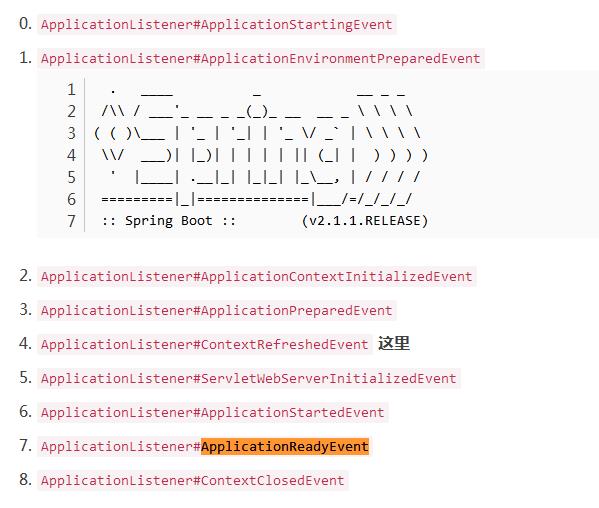spring ApplicationEvent 和 Listener
Posted ayizzz
tags:
篇首语:本文由小常识网(cha138.com)小编为大家整理,主要介绍了spring ApplicationEvent 和 Listener相关的知识,希望对你有一定的参考价值。
ApplicationEvent
ApplicationEvent以及Listener是Spring为我们提供的一个事件监听、订阅的实现,内部实现原理是观察者设计模式,设计初衷也是为了系统业务逻辑之间的解耦,提高可扩展性以及可维护性。
通过ApplicationEvent类和ApplicationListener接口来提供在ApplicationContext中处理事件。如果一个 bean 实现ApplicationListener,那么每次 ApplicationEvent 被发布到ApplicationContext上,那个 bean 会被通知。
Spring 事件的使用
- 事件的定义
1、
ApplicationEvevnt:继承 EventObject 类,自定义事件源应该继承该类
2、ApplicationEventListener:继承EventListener接口,自定义监听者可以通过实现该接口
3、ApplicationEventPublisher:封装了事件发布的方法,通知所有在 Spring 中注册的监听者进行处理
- 注意 : 基于Spring提供的基类,可以进行自定义各类符合业务和流程的事件;自定义的监听者实现类,可以由 Spring 容器进行管理,只需要通过
ApplicationEventPublisher进行发布进行,不用自己去实现监听者的注册、通知等等过程。
ApplicationEvent 源码
public abstract class ApplicationEvent extends EventObject
private static final long serialVersionUID = 7099057708183571937L;
/** 事件发生的时间 **/
private final long timestamp = System.currentTimeMillis();
/** 发布源事件 **/
public ApplicationEvent(Object source)
super(source);
/** 获取事件戳 **/
public final long getTimestamp()
return this.timestamp;
ApplicationListener
@FunctionalInterface
public interface ApplicationListener<E extends ApplicationEvent> extends EventListener
void onApplicationEvent(E var1);
- 注意 :通过实现
ApplicationListener接口来实现一个事件监听者,ApplicationListener接口可以通过泛型事件的传入,来实现对指定事件的监听;通过重写 onApplicationEvent(E event) 方法来实现对事件具体的业务处理
--
ApplicationEventPublisher
@FunctionalInterface
public interface ApplicationEventPublisher
default void publishEvent(ApplicationEvent event)
publishEvent((Object) event);
void publishEvent(Object event);
- Spring 通过 ApplicationEventPublisher 获取 ApplicationContext 进行事件的发布
案例
- 通过继承
ApplicationEvent实现自定义事件
public class TestApplicationEvent extends ApplicationEvent
private String msg;
public TestApplicationEvent(Object source , String msg)
super(source);
this.msg = msg;
public String getMsg()
return msg;
public void setMsg(String msg)
this.msg = msg;
@Override
public String toString()
return "TestApplicationEvent" +
"msg=\'" + msg + \'\\\'\' +
\'\';
- 注意 :
TestApplicationEvent可以添加需要处理的具体实体类的属性进行操作
- 通过继承
ApplicationListener实现自定义监听器
public class TestApplicationListener implements ApplicationListener<TestApplicationEvent>
@Override
public void onApplicationEvent(TestApplicationEvent testApplicationEvent)
System.out.println(testApplicationEvent);
- 通过
ApplicationContext进行事事件的发布
ApplicationContext context = SpringUtil.getApplicationContext();
context.publishEvent(new TestApplicationEvent(this , "123"));
- 注意 : 如果一个事件需要被多个监听器进行处理可以使用
@Order进行监听器执行顺序的之定义,@Order(value = )value 值越小表示执行优先级越高
Spring执行ApplicationEvent事件顺序ServletWebServerInitializedEvent
测试代码:
package com.github.abel533.event; import com.github.abel533.C; import org.springframework.context.ApplicationEvent; import org.springframework.context.ApplicationListener; import org.springframework.stereotype.Component; /** * @author liuzh */ @Component public class ApplicationListenerImpl implements ApplicationListener<ApplicationEvent> { public ApplicationListenerImpl() { C.print("ApplicationListenerImpl#constructor"); } @Override public void onApplicationEvent(ApplicationEvent event) { C.print("ApplicationListener#" + event.getClass().getSimpleName()); } }
package com.github.abel533.event; import com.github.abel533.lifecycle.BeanLifecycle; import org.springframework.boot.SpringApplication; import org.springframework.boot.autoconfigure.SpringBootApplication; import org.springframework.context.annotation.Bean; @SpringBootApplication public class ListenerApplication { public static void main(String[] args) { SpringApplication.run(ListenerApplication.class, args).close(); } }
用以上代码实现 ApplicationListener 接口,输出所有事件。
当以 @Component 方式配置时
事件触发顺序如下:
ApplicationListener#ContextRefreshedEvent
ApplicationListener#ServletWebServerInitializedEvent
ApplicationListener#ApplicationStartedEvent
ApplicationListener#ApplicationReadyEvent
ApplicationListener#ContextClosedEvent
当通过 /META-INF/spring.factories 配置时
配置内容如下:
org.springframework.context.ApplicationListener=com.github.abel533.event.ApplicationListenerImpl
此时输出的事件顺序如下:

差异
很容易通过对比发现,Event 触发的时间极早,以至于 @Component 方式只能从第 4 个事件才开始获取到。
从这两种方式的加载时机来看这个差异产生的原因。
在 SpringApplication 构造方法中,就调用 getSpringFactoriesInstances 来获取 /META-INF/spring.factories 配置的 ApplicationListener,代码如下:
public SpringApplication(ResourceLoader resourceLoader, Class<?>... primarySources) { this.resourceLoader = resourceLoader; Assert.notNull(primarySources, "PrimarySources must not be null"); this.primarySources = new LinkedHashSet<>(Arrays.asList(primarySources)); this.webApplicationType = WebApplicationType.deduceFromClasspath(); setInitializers((Collection) getSpringFactoriesInstances( ApplicationContextInitializer.class)); setListeners((Collection) getSpringFactoriesInstances(ApplicationListener.class)); this.mainApplicationClass = deduceMainApplicationClass(); }
在 SpringFactoriesLoader#loadFactoryNames 实现了从该配置文件获取实现名的方法。从这之后就能收到后续触发的事件。
通过 @Component 方式时,在 SpringApplication#refresh 中调用 registerListeners 获取的所有 ApplicationListener 接口的实现。代码如下:
@Override public void refresh() throws BeansException, IllegalStateException { synchronized (this.startupShutdownMonitor) { try { // 注册所有 ApplicationListener 实现 registerListeners(); // Instantiate all remaining (non-lazy-init) singletons. finishBeanFactoryInitialization(beanFactory); // 这里会触发 ContextRefreshedEvent finishRefresh(); } } }
下面先分析前 4 个无法获取的事件顺序。
ApplicationStartingEvent
第 0 个事件是在 EventPublishingRunListener#starting 中发布的,代码如下:
@Override public void starting() { this.initialMulticaster.multicastEvent( new ApplicationStartingEvent(this.application, this.args)); }
此时的堆栈调用情况如下:
onApplicationEvent:15, ApplicationListenerImpl (com.github.abel533.event) doInvokeListener:172, SimpleApplicationEventMulticaster (org.springframework.context.event) invokeListener:165, SimpleApplicationEventMulticaster (org.springframework.context.event) multicastEvent:139, SimpleApplicationEventMulticaster (org.springframework.context.event) multicastEvent:127, SimpleApplicationEventMulticaster (org.springframework.context.event) starting:69, EventPublishingRunListener (org.springframework.boot.context.event) starting:48, SpringApplicationRunListeners (org.springframework.boot) run:302, SpringApplication (org.springframework.boot) run:1260, SpringApplication (org.springframework.boot) run:1248, SpringApplication (org.springframework.boot) main:12, ListenerApplication (com.github.abel533.event)
ApplicationEnvironmentPreparedEvent
第 1 个事件是在 EventPublishingRunListener#environmentPrepared 中发布的,代码如下:
@Override public void environmentPrepared(ConfigurableEnvironment environment) { this.initialMulticaster.multicastEvent(new ApplicationEnvironmentPreparedEvent( this.application, this.args, environment)); }
此时的堆栈调用情况如下:
onApplicationEvent:15, ApplicationListenerImpl (com.github.abel533.event) doInvokeListener:172, SimpleApplicationEventMulticaster (org.springframework.context.event) invokeListener:165, SimpleApplicationEventMulticaster (org.springframework.context.event) multicastEvent:139, SimpleApplicationEventMulticaster (org.springframework.context.event) multicastEvent:127, SimpleApplicationEventMulticaster (org.springframework.context.event) environmentPrepared:75, EventPublishingRunListener (org.springframework.boot.context.event) environmentPrepared:54, SpringApplicationRunListeners (org.springframework.boot) prepareEnvironment:347, SpringApplication (org.springframework.boot) run:306, SpringApplication (org.springframework.boot) run:1260, SpringApplication (org.springframework.boot) run:1248, SpringApplication (org.springframework.boot) main:12, ListenerApplication (com.github.abel533.event)
ApplicationContextInitializedEvent
第 2 个事件是在 EventPublishingRunListener#contextPrepared 中发布的,代码如下:
@Override public void contextPrepared(ConfigurableApplicationContext context) { this.initialMulticaster.multicastEvent(new ApplicationContextInitializedEvent( this.application, this.args, context)); }
此时的堆栈调用情况如下:
onApplicationEvent:15, ApplicationListenerImpl (com.github.abel533.event) doInvokeListener:172, SimpleApplicationEventMulticaster (org.springframework.context.event) invokeListener:165, SimpleApplicationEventMulticaster (org.springframework.context.event) multicastEvent:139, SimpleApplicationEventMulticaster (org.springframework.context.event) multicastEvent:127, SimpleApplicationEventMulticaster (org.springframework.context.event) contextPrepared:81, EventPublishingRunListener (org.springframework.boot.context.event) contextPrepared:60, SpringApplicationRunListeners (org.springframework.boot) prepareContext:374, SpringApplication (org.springframework.boot) run:314, SpringApplication (org.springframework.boot) run:1260, SpringApplication (org.springframework.boot) run:1248, SpringApplication (org.springframework.boot) main:12, ListenerApplication (com.github.abel533.event)
ApplicationPreparedEvent
第 3 个事件是在 EventPublishingRunListener#contextLoaded 中发布的,代码如下:
@Override public void contextLoaded(ConfigurableApplicationContext context) { for (ApplicationListener<?> listener : this.application.getListeners()) { if (listener instanceof ApplicationContextAware) { ((ApplicationContextAware) listener).setApplicationContext(context); } context.addApplicationListener(listener); } this.initialMulticaster.multicastEvent( new ApplicationPreparedEvent(this.application, this.args, context)); }
此时的堆栈调用情况如下:
onApplicationEvent:15, ApplicationListenerImpl (com.github.abel533.event) doInvokeListener:172, SimpleApplicationEventMulticaster (org.springframework.context.event) invokeListener:165, SimpleApplicationEventMulticaster (org.springframework.context.event) multicastEvent:139, SimpleApplicationEventMulticaster (org.springframework.context.event) multicastEvent:127, SimpleApplicationEventMulticaster (org.springframework.context.event) contextLoaded:93, EventPublishingRunListener (org.springframework.boot.context.event) contextLoaded:66, SpringApplicationRunListeners (org.springframework.boot) prepareContext:393, SpringApplication (org.springframework.boot) run:314, SpringApplication (org.springframework.boot) run:1260, SpringApplication (org.springframework.boot) run:1248, SpringApplication (org.springframework.boot) main:12, ListenerApplication (com.github.abel533.event)
ContextRefreshedEvent
在上面差异中提到 finishRefresh 会触发 ContextRefreshedEvent,代码如下:
@Override protected void finishRefresh() { super.finishRefresh(); WebServer webServer = startWebServer(); if (webServer != null) { publishEvent(new ServletWebServerInitializedEvent(webServer, this)); } }
注意 super.finishRefresh,代码如下(有删减):
protected void finishRefresh() { // Publish the final event. publishEvent(new ContextRefreshedEvent(this)); }
ServletWebServerInitializedEvent
注意前面 finishRefresh 方法,如果存在 webServer != null,就会发布 ServletWebServerInitializedEvent。
ApplicationStartedEvent
在 SpringApplication#run 方法中,执行完成后,就会调用 listeners.started(context); 方法,在这里面会发布 ApplicationStartedEvent。
ApplicationReadyEvent
和上面 ApplicationStartedEvent 一样,如下代码(有删减):
// ApplicationStartedEvent listeners.started(context); callRunners(context, applicationArguments); // ApplicationReadyEvent listeners.running(context);
执行完所有 ApplicationRunner 和 CommandLineRunner 接口方法后,就会调用 listeners.running(context),在这里面就会发布 ApplicationReadyEvent。
在这之后就没有运行期的主要事件了(不考虑 devtools 重启)。在这个事件里,可以请求zookeeper进行服务注册,以便其它服务发现并调用它等相关操作。
ContextClosedEvent
当调用关闭方法的时候,自然就触发了 ContextClosedEvent,调用堆栈如下:
onApplicationEvent:20, ApplicationListenerImpl (com.github.abel533.event) doInvokeListener:172, SimpleApplicationEventMulticaster (org.springframework.context.event) invokeListener:165, SimpleApplicationEventMulticaster (org.springframework.context.event) multicastEvent:139, SimpleApplicationEventMulticaster (org.springframework.context.event) publishEvent:398, AbstractApplicationContext (org.springframework.context.support) publishEvent:355, AbstractApplicationContext (org.springframework.context.support) doClose:994, AbstractApplicationContext (org.springframework.context.support) close:961, AbstractApplicationContext (org.springframework.context.support) main:12, ListenerApplication (com.github.abel533.event)
本文转自:https://blog.csdn.net/isea533/article/details/100146833
以上是关于spring ApplicationEvent 和 Listener的主要内容,如果未能解决你的问题,请参考以下文章